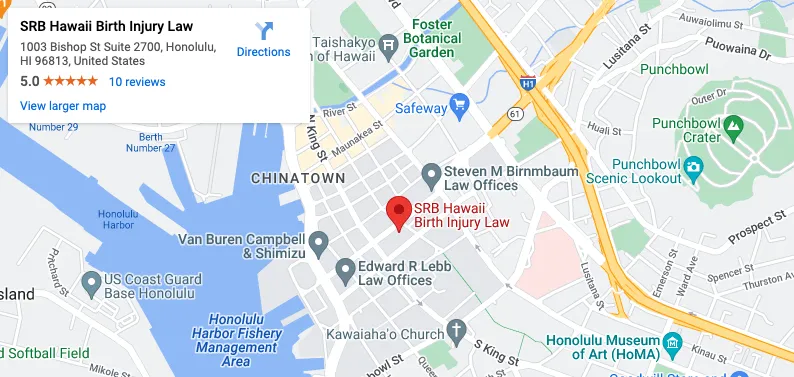Sepsis Legal Services in Hawaii
Sepsis is a serious condition that requires immediate treatment to prevent long-term health issues or death. One of the highest risk groups for developing sepsis are babies. If a hospital’s negligent actions have contributed to the development or severity of your child’s sepsis, you may be entitled to recover compensation for your child’s damages.
At SRB Hawaii Law, we can help you hold all negligent parties accountable. In addition, we will work with the hospitals and medical professionals involved to ensure these mistakes aren’t repeated again in the future. You can learn about your legal rights and options by speaking with Mr. Brzezinski in person.
Please call 1-855-SRB-1817 or (808) 809-7069 today to schedule a complimentary consultation. We serve clients on all of the Hawaiian Islands.
What is Sepsis?
Sepsis develops when your body displays a life-threatening response to an infection. Your immune system will release certain chemicals into your bloodstream to help fight an infection. However, there are some instances when these chemicals are released in toxic levels and begin to damage your organs. This extreme reaction is called sepsis.
Prompt treatment is crucial. Otherwise, you may experience tissue damage, organ failure and potentially death. Individuals with weakened immune systems are at greater risk of developing sepsis. These groups include:
- Babies and young children
- Elderly people
- Individuals with chronic illnesses
- Individuals with diseases such as HIV that compromise your immune system
- People receiving chemotherapy treatment for cancer
What is neonatal sepsis?
Neonatal sepsis occurs when a baby develops an infection in the bloodstream during the first three months of life. The infection can be caused by a variety of pathogens, including viruses and bacteria. There are two types of neonatal sepsis:
- Early onset – The infection developed before or during the birth process. Pathogens are transmitted from the mother’s reproductive system to the newborn.
- Late onset – The infection developed after birth. Pathogens from the environment are transmitted to the baby from contact with healthcare professionals and other caregivers.
Early diagnosis and prompt treatment can often lead to a full recovery from neonatal sepsis. However, failure to treat the condition in a timely manner can result in serious conditions, including:
- Cerebral palsy
- Brain injury
- Meningitis
- Septic shock
- Seizures
- Death
What are the causes & risk factors of neonatal sepsis?
Many of issues that may increase your risk of neonatal sepsis occur during pregnancy. These include:
- Preterm delivery
- Group B streptococcus (GBS) infection
- Water breaking more than 18 hours prior to delivery
- Chorioamnionitis (an infection of the amniotic fluid and placenta)
Post-delivery risk factors that can contribute to late onset sepsis include:
- Extended stays in the hospital before being sent home with the mother
- The presence of a catheter in a blood vessel for an extended period of time
If any of these risk factors exist, it’s crucial that the baby is closely monitored for warning signs of sepsis. If the mother has GBS, chorioamnionitis, or a prior history of delivering a baby with sepsis or another serious infection, she should be prescribed antibiotics as a preventive measure. Other ways doctors can guard against neonatal sepsis include:
- Maintaining clean and sanitary conditions in the delivery room
- Delivering the baby within 24 hours of the mother’s water breaking
- Performing a C-section no longer than 6 hours after the mother’s water breaks
Other potential causes of neonatal sepsis include:
- E-coli
- Listeria monocytogenes
- Staphylococcus aureus
- Herpes simplex virus (HSV)
- Premature rupture of membranes
- Mother has a fever during birth
- Use of forceps during delivery
- Use of electrodes for intrauterine monitoring
What are the common symptoms of neonatal sepsis?
Common symptoms of sepsis in babies include:
- Jaundice
- Diarrhea
- Fluctuations in heart rate
- Vomiting
- Difficulty breathing
- Seizures
- Abdominal swelling
- Fever
- Apnea (brief stoppages in breathing)
- Problems feeding
- Fever or low body temperature
- Low blood sugar
Diagnosis & Treatment of Neonatal Sepsis
Diagnostic tests for sepsis in babies include:
- Blood cultures
- C-reactive protein test
- Spinal tap
- Urine cultures
- Chest x-ray
Early treatment is crucial for a successful outcome. Common treatment options include:
- Intravenous antibiotics
- Oral antibiotics
- Antiviral medications
SRB Hawaii Law Can Help
If your child’s sepsis was caused or exacerbated by medical negligence, you may be entitled to recover compensation for your child’s damages. Mr. Brzezinski has witnessed firsthand the devastation caused when babies develop sepsis, and he will stand by your side every step of the way to ensure your child receives the proper care and assistance after this serious illness.
While most hospitals and medical professionals do an excellent job, mistakes happen on occasion. Mr. Brzezinski is committed to helping you get the compensation you deserve, and he also works with healthcare professionals to make sure these mistakes don’t happen again in the future.
Please contact SRB Hawaii Law using the form on this page or call 1-855-SRB-1817 or (808) 809-7069 today to schedule a complimentary consultation. We serve clients on all of the Hawaiian Islands.


